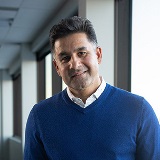Beyond a Title: How APEGA helps newcomers continue their careers

When he was 17 years old, Enayat Aminzadah came to Canada from war-torn Afghanistan, where he and his family “had no security and no future.” Canada provided them security, but that didn’t mean their new future would be easy. “My uncle was a doctor, and he wasn't able to practise when we arrived. He had a hard time finding support so his credentials could be recognized. That part really hit home for me.”
From Immigration Officer to International Qualifications Officer
It hit so hard that after taking economics and political science at the University of Toronto, Aminzadah started working as an immigration officer, processing permanent residency applications. He says it was a humbling experience because “it's a system where you don't speak to anyone—you file an application, and you hope someone will pick it up and actually understand that person’s story. It’s very systematic, and it depends on the point system. However, it was satisfying to approve an application or recommend an applicant to become a permanent resident in Canada.”
Aminzadah says being on the other side of the immigration table previously serves him well now in his role as the international qualifications officer with the Association of Professional Engineers and Geoscientists of Alberta (APEGA), where he helps newcomers apply for accreditation for engineering and geoscience.
APEGA’s Pioneering Role in Supporting Newcomers
When he started in 2014, APEGA was Canada’s only engineering and geoscience regulator with a full-time position dedicated to helping internationally trained applicants. “APEGA receives the most applications of any regulator in Alberta. In 2023, we had 6,360 applications, with 45 per cent being from internationally trained applicants. Applicants required a lot of guidance and information, so APEGA needed someone passionate about helping them go through the licensure system and with the skills and experience to advise them on the correct pathway to success.”
A Childhood Curiosity Turned Career
One person Aminzadah advised was Manik Sharma. Sharma was unaware that his keen interest in understanding machines was leading him towards the engineering profession. As a child growing up in India, he loved taking things apart to see how they worked, and his curiosity only grew with his education.
“To me, engineering is a kind of magic,” says Sharma, who, after graduating from university in India in 2014, was already working for Honda by 2018. But Sharma always sought to learn more and challenge himself, and he had felt he’d reached his “saturation point” working in India. “So, I thought, let's try something new now, and I found that Canada is a place where people worldwide come to develop their careers.”
After a two-year COVID-19 delay, Sharma landed in Calgary in 2022, totally alone. But he knew about APEGA’s licensure process before leaving India, and he found a friendly face shortly after he arrived.
"I went to the Calgary Catholic Immigration Society and Direction for Immigrants, and they talked a lot about APEGA and the engineering process. They introduced me to Enayat, and we had a video call from there. I would say that once I connected to APEGA, everything was very clear.”
The Human Touch: Guiding Applicants Through the Process
Unlike the faceless immigration process, Aminzadah advises many internationally trained applicants in person at information sessions hosted by immigrant-serving agencies across Alberta. Aminzadah puts a human face to APEGA’s regulatory role that goes beyond checking certifications. "For a lot of these applicants, they’ve been practising in their fields for many years. Back home, they're recognized as an engineer or a geoscientist, but some of those countries don’t regulate those professions. So, when they come here and learn about the licensure process required to use the professional title and designation, they feel frustrated.”
Aminzadah puts them at ease by listening first, then helps them start the process, which he recommends they start before even leaving their home countries, when possible. The process culminates in an accreditation exam that all applicants, including those from Canada, must take. While most applicants do well on the technical sections, Aminzadah says the section on ethics can be challenging due to cultural differences.
Navigating Cultural Differences in Professional Ethics
“In some countries, authority is deeply ingrained, and orders are expected to be followed without question. However, for regulated professionals, the responsibility to protect the public comes first. Professionals are expected to raise concerns if a supervisor requests an action that could jeopardize public safety. If these concerns are disregarded, they should refuse to do the work and may need to report the issue to APEGA.”
When I passed my ethics exam, I found it very useful,” Sharma says. "I think people coming from different parts of the world need to know what the processes are in Canada and the rules and regulations that need to be followed. There are things that need to be verified to show that you are capable of being an engineer because it’s important for public safety.”
A Future Realized: The Impact of Support and Accreditation
Sharma’s accreditation process is almost complete, and he’ll soon continue in the profession he’s loved since childhood. It’s a moment that Aminzadah never tires of seeing.
"I feel a lot of satisfaction when someone I helped through the application process reaches out—whether through text, email, a quick phone call, or in person—to let me know they’re now registered. It becomes a source of motivation for me and makes this a very satisfying role.”
